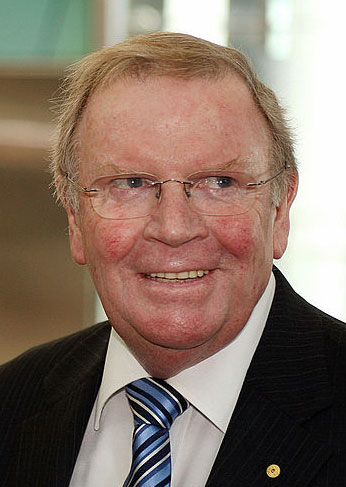Farewell to a giant of Australian economic reform
By Peter N Varghese AO
Ted Evans AC, who sadly passed away on Easter Sunday, was one of the key figures in a remarkable era of economic reform in Australia, from the Hawke through to the Howard governments.
Ted was not only an outstanding public servant. He was a man of integrity, deep conviction and commitment to the concept of the public good and the wellbeing of all Australians.
I had the privilege of working with Ted during the Asian financial crisis of 1998–99, including travelling with him to the region to explain Australia’s response.
Ted was renowned as a softly spoken Treasury man, who offered forthright advice to both sides of politics.
He was a fine economist, a trusted adviser and confidante to a generation of Australian political leaders and public servants, and a proud UQ alumnus.
In the days following his passing, Ted has been rightly lauded for helping to drive the economic reforms that have significantly boosted our national prosperity and underpinned a remarkable record of economic growth.
The Prime Minister Scott Morrison said, “Ted has left an indelible mark on Australia."

Treasurer Josh Frydenberg praised his “powerful advocacy and intellectual leadership, which was behind many of the key economic reforms in the 1980s, 1990s and 2000s”.
The son of a fitter and turner, Ted grew up in Ipswich.
He left school at the age of 15 to join the Postmaster General’s Department, where he gained work as a telecommunications technician.
He later returned to finish his schooling and went onto gain his Bachelor of Economics (Honours) from UQ in 1968.
After graduating, he moved with his young family from Brisbane to Canberra in 1969 to take up a position with the Department of Treasury, where he enjoyed a stellar career over the next 32 years.
He represented Australia on the global stage twice during this period. First, he was posted to the Organization for Economic Cooperation and Development (OECD) in Paris, from 1976–79; and later he served as an Executive Director to the International Monetary Fund (IMF) in Washington DC, from 1989–93.
He ultimately rose to the most senior leadership position in the Australian Treasury, serving as Secretary of the Department from 1993 to 2001.
But it was as Deputy Secretary of the Treasury in the mid-1980s that Ted earned his reputation as an innovator who was prepared to take risks by advocating for major macro-economic reform. During this period, he formed a particularly close and productive partnership with Treasurer Paul Keating.
In a decisive meeting with Keating to discuss the merits of floating the Australian dollar in late 1983, Ted reportedly disagreed with his own boss, the then Treasury Secretary John Stone.
When put on the spot, Ted argued in his own quiet way in favour of the float. Stone was opposed to the float. One commentator has described Ted’s intervention as “the whisper that changed a nation”.
Just weeks later – on 12 December 1983 – Keating decided to float the dollar, creating the foundation for further deregulation and a more open, competitive Australian economy.
In the decade that followed the float, the Hawke-Keating governments set about reforming many aspects of the Australian economy. Major labour market reforms were introduced. The financial industry was deregulated. And the tax system was overhauled.
In a tribute published last week, Paul Keating wrote of Ted Evans, “He was a prince in a bureaucracy at the peak of its powers and influence. A peak he had helped create.”
“Ted Evans believed in policy innovation and was always brave in breaking formerly forbidden policy ground. Ted was always restrained but invested with fierce beliefs, which he held in a vice-like grip.”
It’s a description that encapsulates Ted’s vision, his intellect and his quiet determination to get things done.
Following the election of the Howard Government in 1996, Ted continued in the role of Treasury Secretary – and he continued to offer his trademark style of candid policy advice to the newly appointed Treasurer, Peter Costello.
Costello described him as a “superb public servant”, who “gave frank and fearless advice” and was always “above and beyond partisan politics”.
“He was a supporter of floating the currency when the Treasury was opposed to it. He backed the independence of the Reserve Bank when we introduced that in 1998. He was there for the introduction of the GST and balancing the budget,” Costello said.
“He had an encyclopaedic knowledge of where all the levers of the Australian economy ran. While he was there, the Treasury was at its absolute height. He made an enormous contribution to Australian economic policy and his legacy will be enduring.”
After retiring from the public service in 2001, Ted was appointed to the Board of Westpac. He served as a Director of Westpac for a decade, including four years as Chairman from 2007 to 2011. During his tenure as Chair, he played a key role in guiding the bank’s response to the global financial crisis and the subsequent merger with St George.
Gail Kelly, Westpac’s CEO at the time, said, “he was an absolute pillar of strength during that period, with the clarity of thought and strength of intellect he brought to the discussions."
Ted’s lifelong contribution to improving the fundamentals of Australia’s economy has been recognised with several awards. He was made a Companion of the Order of Australia in 1999, he was honoured as UQ Alumnus of the Year in 2001, and he was awarded an Honorary Doctorate of Economics from UQ in 2012.
In 2017, the Economic Society of Australia established the Ted Evans Public Policy Lecture, in partnership with UQ, QUT and Griffith University, as an annual forum for the discussion of economic policy.
He is survived by his wife Judith, two children from his first marriage to Heather, and two step-children.
Peter N Varghese AO is Chancellor of UQ and the former Secretary of the Department of Foreign Affairs and Trade.



